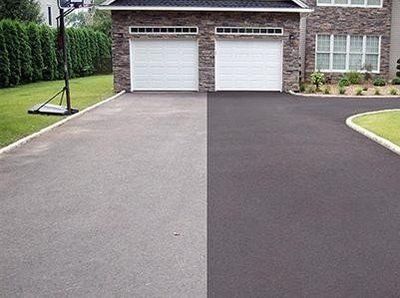Seal in Quality: Specialist Solutions for Asphalt Repair and Sealing
Seal in Quality: Specialist Solutions for Asphalt Repair and Sealing
Blog Article
Cold Mix Asphalt Vs. Hot Mix Asphalt: Which Is Right for You?

Composition Distinctions
Cold mix and warm mix asphalts differ dramatically in their structure, with distinct attributes that impact their efficiency and applications. Cold mix asphalt is generated by emulsifying the asphalt binder with water and an emulsifying agent before blending it with accumulation. This method permits for the asphalt to be practical at lower temperatures, making it optimal for short-lived fixings and for usage in cooler weather. Hot mix asphalt, on the various other hand, is manufactured at heats, commonly in between 300-350 ° F, which aids to attain much better compaction and a much more sturdy end product. The warm mix asphalt production procedure involves warming the aggregate and asphalt binder independently prior to combining them at the asphalt plant.
Furthermore, cool mix asphalt has a tendency to be much less dense and a lot more versatile than warm mix asphalt. This flexibility makes it far better suited for areas with greater degrees of motion, such as driveways or roadways with hefty web traffic. On the other hand, warm mix asphalt is known for its high durability and resistance to rutting and splitting, making it a favored selection for freeways and high-traffic roadways where long life is vital.
Installation Refine Variances
The procedure of mounting chilly mix and hot mix asphalt shows remarkable variations in their procedures and requirements. In comparison, warm mix asphalt demands a much more sophisticated installment process. Due to the home heating needs, hot mix asphalt installments are normally lugged out by specialists with specialized equipment, making sure an extra structurally sound and permanent outcome.
Resilience and Durability Factors
When taking into consideration asphalt options, sturdiness and durability are vital variables to evaluate for enduring pavement efficiency. Warm mix asphalt (HMA) is understood for its phenomenal durability and durability. The high temperatures during the laying and blending procedure enable better compaction, resulting in a denser and more powerful pavement structure. This brings about HMA being extra resistant to heavy traffic lots, extreme weather condition conditions, and the effects of aging compared to chilly mix asphalt (CMA)
In regards to durability, HMA generally outmatches CMA because of its premium toughness and resistance residential or commercial properties. HMA sidewalks have a longer service life, requiring less regular fixings and maintenance, which can convert to cost savings in the future. Additionally, HMA pavements are much more conveniently customizable to fulfill certain project requirements, better improving their sturdiness.
Cost Factors To Consider
Thinking about the financial ramifications is a crucial aspect when assessing the option in between hot mix asphalt (HMA) and chilly mix asphalt (CMA) for pavement projects. While the initial expense of warm mix asphalt is generally higher than that of cool mix asphalt, HMA frequently offers an extra cost-efficient remedy in the long run due to its exceptional toughness and longevity.
In addition to material expenses, it's necessary to consider the expenses linked with installation and upkeep when comparing HMA and CMA. Eventually, the decision between HMA and CMA need to take into account not simply the first cost however additionally the long-lasting financial effects to identify the most economical option for the certain sidewalk job.
Environmental Effect Contrast
Contrast of the ecological influences between warm mix asphalt (HMA) and cold mix asphalt (CMA) exposes distinctive distinctions in sustainability methods. HMA production requires high temperature levels, resulting in raised power consumption and greenhouse gas discharges. The procedure additionally releases unstable natural substances (VOCs) and harmful air toxins (HAPs) right into the ambience. On the other hand, CMA is generated and applied at reduced temperatures, lowering power usage and exhausts dramatically. The lower production temperature levels of CMA lead to reduced gas intake and reduced degrees of carbon dioxide exhausts, making it a much more eco-friendly choice.
In addition, the usage of CMA usually entails reusing existing asphalt sidewalk, promoting source conservation and reducing the quantity of waste sent out to garbage dumps. By choosing for CMA over HMA, roadway building and construction jobs can contribute favorably to environmental conservation initiatives.
Conclusion
In conclusion, the selection between cold mix asphalt (CMA) and warm mix asphalt (HMA) depends upon different elements such as make-up, installment procedure, durability, longevity, cost, and ecological influence. angle parking. While CMA uses a quick and cost-efficient solution for small fixings, HMA guarantees remarkable toughness and longevity for heavy traffic locations. Consider these factors very carefully to determine which sort of asphalt is the best selection for your paving needs

Taking into consideration the economic ramifications is an important facet when evaluating the selection in between hot mix asphalt (HMA) and cold mix asphalt (CMA) for sidewalk projects. While the preliminary cost of hot mix asphalt is usually greater than that of chilly mix asphalt, HMA commonly gives a more cost-efficient remedy in the lengthy run due to its premium resilience and long life. asphalt repair.Comparison of the environmental impacts in between warm mix asphalt (HMA) and cold mix asphalt (CMA) exposes unique differences in sustainability practices.In conclusion, the selection in between chilly cold mix asphalt mix asphalt (CMA) and warm mix asphalt (HMA) depends on various factors such as composition, setup process, durability, durability, price, and environmental influence
Report this page